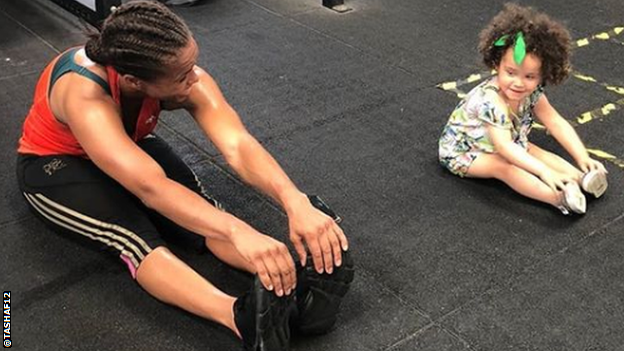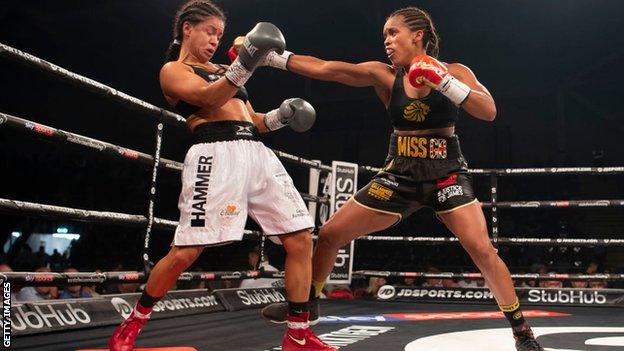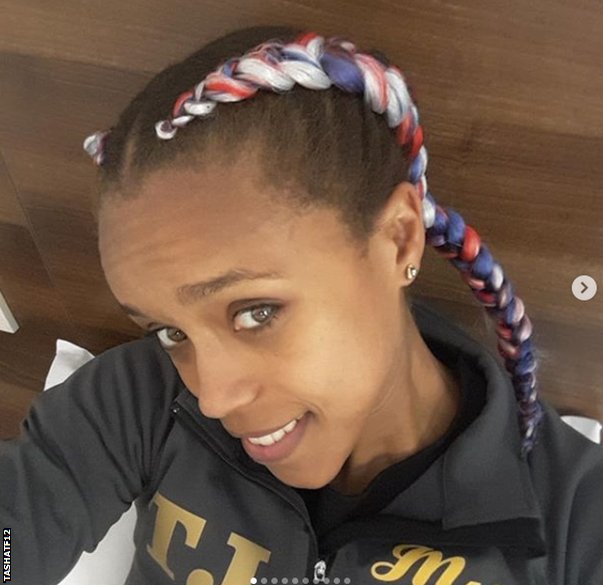Natasha Jonas: I enjoy pain of pulling my hair out, but didn't know it was a disorder
- Published
Britain's first female Olympic boxer Natasha Jonas on her hair-pulling condition.
When Natasha Jonas gets stressed, she pulls her hair out. She enjoys the pain.
Jonas became the first female British boxer to compete in the Olympics in her home Games in London in 2012 and won her first professional fight in 2017 in just 92 seconds.
But it was only this year, aged 34, that the Liverpudlian recognised her hair-pulling habit is defined as a disorder by the NHS - trichotillomania., external
Here, Jonas tells BBC Sport how she is now working with a psychologist and why she is limited to certain hairstyles.
Starting off - a nervous habit
When I was a baby, I had a blanket that I liked to rub. Even as I got older, I used to rub the sheet. I still do that to this day with labels and things, I've never stopped that tactile type of thing.
It just developed to my hair, I don't even know how, I just did it.
You have the little bits of tufts at the bottom which don't fit into a bun or plait and it's those bits I started with - and the little tufts at the front, the baby hair.
Once I'd pulled that row out, you had to move higher, I moved and I kept doing that until I'd got half way up my head. I had 'Ms' at the front and side of my hair.
It started when I was doing my GCSEs and I needed to do well to go on to A-levels and be able to get into a scholarship position in an American university, because I wanted to play football - or soccer, as they call it.
I knew I needed to do well. I wasn't always great academically, so it was a nervous thing. Then it went to a comfort thing, any time I was stressed.
Enjoying the pain of pulling my hair out
Physically, it is like a pleasure-pain thing.
When my mum did my hair, there was only certain hairstyles she could do because my hairline at the back was so far up and the hair at my side wouldn't fit in.
Mentally, I didn't see it as a bad thing because it was combating and helping me to relieve stress. If it wasn't the hair pulling how else would I have handled the stress?
I'm working with Phil Steele (psychologist and hypnotherapist, The Mind PT) to recognise when it comes, what triggers it and what starts it. Now it's starting to have a mental impact, in that I know why I do it and when the time's coming that I'm going to start doing it.
Because I was never hurting anyone else, I never saw it as an issue. Sometimes my mum or my nan would say 'what are you doing that for?' and I would say 'is it hurting you?' and because it didn't hurt them - if I was losing hair it doesn't bother anyone else - I never thought it was a problem.
I wasn't getting moody and shouting at other people, I was just sitting there quietly pulling my hair out.
My two nieces actually do it. One does her eyebrows, she has ended up with no eyebrows. The other one has pulled her hair so much that one side is a good three or four inches shorter than the other, and I get blamed for that.
My three-year-old daughter did copy when she was younger, but she has stopped on her own.

Natasha Jonas says she loves her three-year-old daughter's full 'afro' hair
Attempting to stop
I never thought it was a problem - it was only through watching something on TV a couple of years ago that I realised it's actually a thing.
By this time I was older and I thought it was just a comfort thing and it stopped me from stressing.
But my mum phoned me up laughing and asked me if I'd seen the programme. I watched it and I thought 'that's what I do', then I knew it was actually called something.
From then on I knew I could relate to somebody else about what I was doing. It wasn't until now, within the last five months, that I've even attempted to stop doing it, get help for it or see if there's ways I can combat it.

Natasha Jonas (right) suffered a shock defeat to Viviane Obenauf in the WBA International Super-Featherweight Championship fight in August
People don't get why you'd hurt yourself
I didn't have to tell anybody I was doing it because it was quite visible.
I think it was my GB team-mate Lisa Whiteside who commented 'why are you always messing with the back of your hair?'. People saw me doing it and never actually realised what I was doing.
It was only Lisa who, because we were roommates, ever asked. I said 'Oh, I'm just pulling my hair', and that would be around times of competition when the stresses would make me do it. I can go months without doing it, but when the stress comes on I can feel myself starting again.
Lisa's reaction was 'doesn't that hurt?' - the usual questions. People just don't get it, why you would want to hurt yourself and you're losing hair? I haven't got enough hair as it is, the one thing I don't want to do is lose it, but it's such a bad habit that I can't stop it even though I am working on it now.

Natasha Jonas shows off some of her improvised hairstyles on Instagram
I'm limited to certain hairstyles
Now, some parts of my hair does grow back but it will never reach the lengths of other parts.
I'm limited to certain styles if I want it to be natural or want it to be a certain way, so that's the lasting effect. But now it's about understanding there are other options for relieving stress than pulling my hair out.
A lot of people don't realise it is even anything. Once you know you do it, research it, have a look and see if there's anyone who can help you relieve stress in other ways.
The big thing is to realise you're doing it and you're not the only one. It's just like any other issues - there are other ways to deal with the stress you're going through.
Natasha Jonas was speaking to Jessie Aru-Phillips for BBC 5 live's Sista Collective podcast